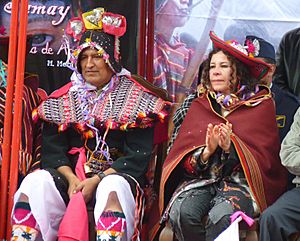Pukllay facts for kids

Pukllay (pronounced Pook-lye) is a lively and colorful traditional festival celebrated in the Andes mountains, especially in Bolivia. The word "Pukllay" comes from the Quechua language and means "to play" or "carnival." This name refers to how the clouds or flower blossoms seem to "play" in the wind at the end of the rainy season, which is also when harvest time begins.
In Bolivia, the Pukllay festival is often linked to the Christian carnival celebrations. It also celebrates an important historical event: a battle won against the Spanish. Because of this, you can still see dancers wearing parts of Spanish armor, like helmets and spurs, during the festival.
In March 2011, Bolivia asked UNESCO to recognize the Pukllay festival from Tarabuco as a World Heritage event. This nomination included a special dance called Ayarichi, performed by the Yampara people. This recognition would help protect Pukllay as an important part of humanity's cultural history.
Contents
What is Pukllay?
Pukllay is a vibrant festival that brings communities together in the central Andes. It is a time for celebration, music, and dance. The festival marks the end of the rainy season and the start of the harvest. This means it's a time to celebrate the land and the food it provides.
The Meaning of "Play"
The name "Pukllay" is very special. It describes the playful way nature behaves during this time of year. Imagine the clouds dancing in the sky or the colorful flowers swaying in the gentle breeze. This "play" of nature is what the festival celebrates, connecting people to the natural world around them.
Pukllay in Bolivia
In Bolivia, Pukllay is particularly important. It blends ancient traditions with historical events. The festival in Bolivia has a unique connection to a victory over the Spanish during colonial times. This historical link is shown through the costumes and dances.
Costumes and Dances
During Pukllay, dancers wear special outfits. You might see them wearing helmets and spurs, which are symbols of the Spanish soldiers they defeated long ago. These elements are not meant to be scary but to remember a significant moment in their history. The dances are full of energy and tell stories of their past and their connection to the land.
Pukllay and UNESCO Recognition
In 2011, Bolivia took a big step to protect the Pukllay festival. They asked UNESCO, which is the United Nations Educational, Scientific and Cultural Organization, to recognize it as a World Heritage event.
Why UNESCO Recognition Matters
Getting UNESCO recognition is a huge honor. It means that Pukllay is considered very important for all of humanity. This helps to make sure the festival's traditions, music, and dances are preserved for future generations. It also brings attention to the rich culture of the people in the Andes.
Learn More
- In Spanish: Pukllay para niños

